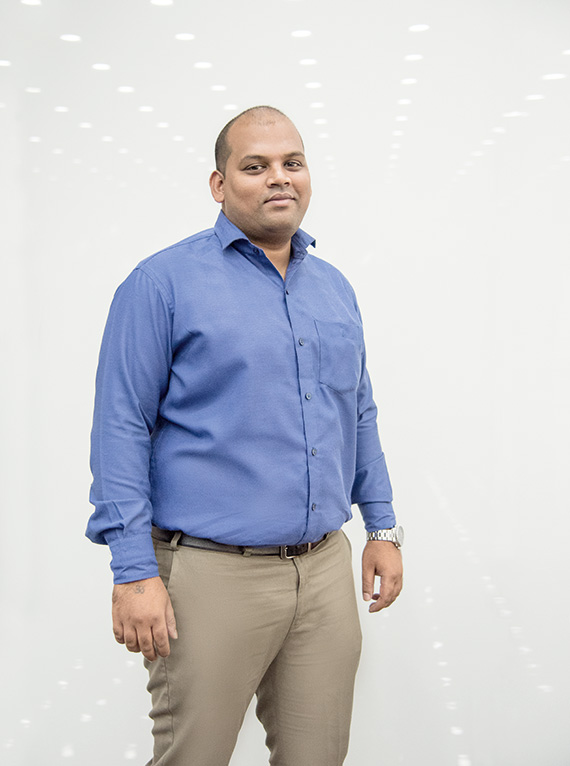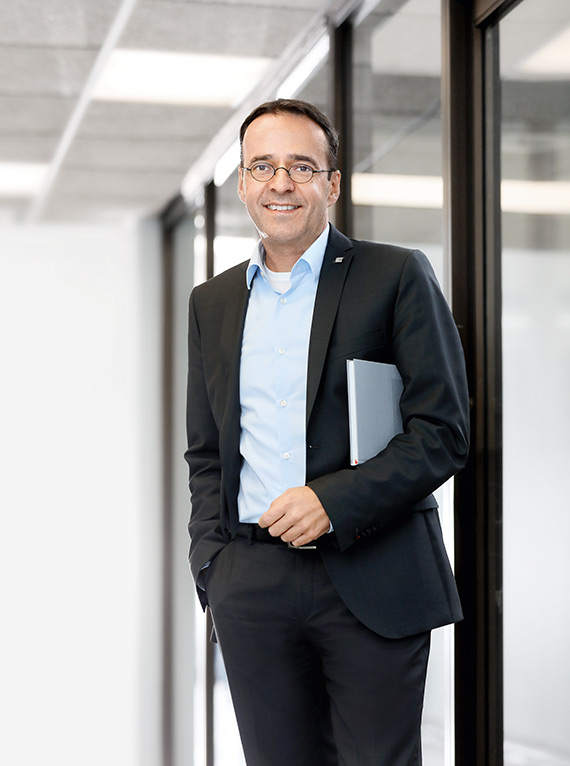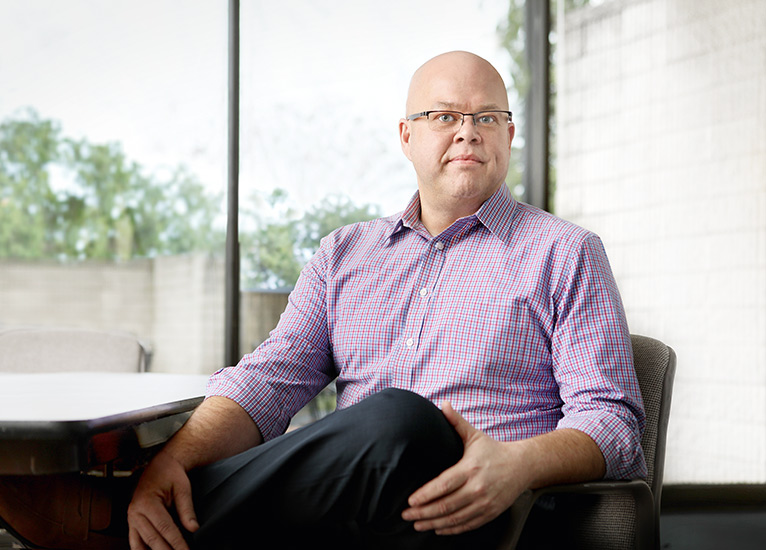Building Connections
Clariant’s new Shared Service Center in Mumbai not only delivers great customer service. It has also spawned global friendships.
When Ganesh Nadimetla boarded a plane in July 2017, he was nervous. He’d never been to the United States, never that far from his family nor for that long. »I really didn’t know what to expect«, he says. »I had joined Clariant only a couple of months earlier and now they were flying me across the globe.« His flight would take him from his home in Mumbai to Clariant’s North American Headquarters in Charlotte, North Carolina. He would stay there for almost three months to train for a job he’d soon be doing back in Mumbai.
3
Ganesh Nadimetla and some of his colleagues stayed for on-the-job trainings for three months in Charlotte, North Carolina.
»I was hired to do customer services, specifically order processing«, Ganesh explains. »That means dealing with customers, entering orders, resolving issues that may come up with logistics or supply chain planning.« Ganesh has ten years of experience doing this kind of work. He has worked for several multinationals, most of them chemical companies. »However, I had always worked by proxy, via outsourced service providers, never for the company directly«, he says. With Clariant it is different. Today, Ganesh is part of a Clariant organization called Global Business Services that in 2015 set up a Shared Services Center in Mumbai. It handles what’s called Order-to-Cash, the processing of orders for the Business Units Additives and Pigments. The orders in question come from customers in the United States and Canada.
The idea of bundling together services such as finance, customer services, logistics and others for certain Business Units and regions in a central location is part of the evolution of a shared services center concept that Clariant introduced in 2013. It forms the basis of Clariant’s Global Business Services unit. Today Clariant operates three shared service centers, or SSCs, located in Lodz, Poland, Mumbai, India, and Dalian, China. They handle services across all regions and several businesses as well as Service Units in an end-to-end approach spanning accounts payable, accounts receivable, procurement, reporting, master data management, logistics, credit risk management and order-related customer service activities. The Lodz center serves customers in more than a dozen languages. Mumbai is focused on English language serviced countries in Asia Pacific and, increasingly, North America. The SSC deals with clearly defined and standardized transaction-based services or »end-to-end processes«, as they are referred to in process-management jargon. That makes it easier to bundle and optimize services across different businesses, which in turn makes them more efficient.
10.5
Due to time difference of 10.5 hours between North America and India, the team in the SSC in Mumbai works night shift.
With a growing number of colleagues, the expanded new customer service operation in Mumbai is contributing significantly to the growth of this service delivery model. »Our setup is tailored towards the needs of the North American market«, says Christopher Spahn, who heads the team in Mumbai and previously led global transitions into Clariant’s centers in Lodz and Mumbai. He says he is especially impressed with the speed, quality and consistency with which the new customer service team in Mumbai is delivering service. »That’s really important to us, because order processing is a service that’s very close to our customers. So this isn’t about outsourcing services to a country with low labor costs. Ganesh and all the others are a vital part of Clariant and the North American team.«


Janice Nazer
Inside Sales Specialist Business Unit Additives, USA
»Ten years in customer service, but I have never worked directly for a multinational. It’s great to be part of a global team.«
GANESH NADIMETLACustomer Service Representative
Shared Service Center, India
That distinction became perfectly clear once Ganesh arrived in Charlotte. »We got the full tour of the production site. We actually got to experience how and where the products are made. And who the people behind it all are«, Ganesh remembers. That’s when he got to know Janice Nazer. She’s an Inside Sales Specialist for Clariant’s Additives Business Unit but had also been handling orders for the past two years. Ganesh was to shadow her at work and learn the trade during the so-called knowledge transfer phase on site. »At first, I thought Ganesh would be in my office for maybe a week or two and then we’d find him an office of his own«, she remembers. »But he was so eager to soak up everything there was to know. In the end, we shared my office for the whole length of his stay.« Together they worked through practically anything that can come up. And they became friends.
»Janice took me in like family«, Ganesh says. »We talked a lot about our lives. I got to meet her husband.« Janice could relate somewhat to Ganesh being away from home. She had herself moved to Charlotte from Chicago only two years ago and had come to the U.S. from the Philippines as a teenager. »Ganesh talked a lot about his family and his life in India«, she says. »It was interesting and we just connected. I sometimes miss having him in my little office to chat.«
After long days at the office, the Indian coworkers explored the sights of Charlotte and went out for dinner with their American colleagues. Janice remembers going out to a restaurant only to find out it was ›Elvis Night‹. »It turns out, Ganesh knew Michael Jackson but had never heard of Elvis.« Needless to say, Janice had a lot of explaining to do. The professional knowledge transfer was more intense and highly structured. »We analyzed our current processes in order management and then mapped out an improved system as well as all the tasks our team in India would have to perform«, explains Joe Rhinehart. As a Global Process Expert in Order-to-Cash he led the transition from Charlotte and evaluated the progress of each trainee. »We tracked which types of transactions each trainee had already worked on and spoke to them every day about how things were going«, he says. There were tests and a lot to learn. »There’s more to it than people think«, says Janice. »It’s not just taking orders and entering them into a system. You have to have people skills, obviously, and you have to be creative. Say, if you’re re-routing orders in order to meet a certain deadline.«

»Order processing is a service very close to the customer and therefore very important for our success.«
Christopher Spahn Head of Shared Service Center, India
But it wasn’t just the Indian team who had to be brought up to speed. »Janice introduced me via e-mail to her 300 plus customers, telling them about the upcoming changes and how we were training together in order to ensure a smooth transition«, Ganesh remembers. There were concerns that had to be addressed. »Probably everyone in America has at one point dealt with a customer services rep in India«, says Joe. »I know I have, with my credit card company, for example. It’s not always great.« More than once he, Janice and others had to explain that they weren’t outsourcing customer services. »I just recently told a customer from New York about Ganesh specifically, what he’ll be doing for him and how we both worked together«, Janice says. It’s not that common for US employees to know their Indian customer service reps by name, let alone, to have celebrated Elvis Night together.

»We analyzed our current processes and then mapped out an improved system that is being implemented in India.«
Joe Rhinehart Global Process Expert
Order-to-Cash, USA
Part of the American team had to be brought onboard as well. Janice was more than happy to teach Ganesh. »I was actually hired to do sales, following up on leads, calling up existing and potential clients. That is also my professional background«, she says. »It was only during the last two years that I took on order processing as well and, to be perfectly honest, it ate up way too much time for me to still be effective in sales.« So giving up order processing came as a relief and a way to focus on sales again. But not all of her colleagues immediately saw it that way. Some feared they were essentially teaching people to take over their own jobs. »That’s an impression we had to deal with«, says Joe. »But we were able to transfer the majority of our people into jobs higher up in the value chain. A few were retiring anyway. In the end, only a single person decided to look for new work outside Clariant.«
In October of 2017 it was time for Ganesh to fly back to Mumbai and start working from there. The service desk was going live. In fact, Ganesh wasn’t the only one boarding a flight to India. Joe Rhinehart, Janice Nazer and Joellen Kuebler, the Head of Order Management for the Pigments Business Unit, came to help with the launch. Joe, Janice and Joellen, or the »Flyin’ Jays«, as they jokingly referred to themselves, got to work, now shadowing their Indian counterparts instead. At first, the SSC in Mumbai was processing orders for about 60 percent of the customer base. When that worked smoothly they added the remaining 40 percent. This soft launch made for a rather anticlimactic experience: »There really wasn’t that Day Zero«, Joe remembers. The team in Mumbai more or less just eased into things. »I wasn’t at all surprised«, Janice says. »Ganesh was basically doing my job weeks before he even left for India. His performance had brought around even the most critical of customers. To them, there really was no discernible difference in terms of service quality.«
300
Roughly 300 customers of Business Unit Additives in North America are served from India.
Obviously there are some differences. Ganesh speaks perfect business English but with a heavy Indian accent. »That’s never been a problem«, he says. »Especially since 90 to 95 percent of our communication is via e-mail anyway.« And for those e-mails, the response time has dropped significantly, meaning customers get a reply and their unique job number almost immediately, with timely follow-ups if necessary.
Janice and Ganesh still stay in touch. She’s still the liaison for the Additives Business Unit. »We talk on the phone a couple of times a week«, Janice says. Ganesh enjoys hearing her all-American idioms, the occasional »awesome« and »oh, my gosh!« And she has fond memories of her short stay in Mumbai. »The whole team was so open and welcoming to us. They all wanted to introduce us to Indian culture and cuisine.« Ganesh also wanted to introduce her to his wife and two kids. »It was the time of Diwali, the festival of lights, when we were there«, Janice remembers. »The streets were packed even for Mumbai’s standards. It was an experience I’ll never forget.« But working there was hard at times, too. To synchronize with North American business hours, the team at the SSC works night shifts from 5:30 pm until 2:30 am. »Working nights can be tough on you«, Ganesh says. But there are upsides too. Like when he rides his bike home from work in the early hours of the morning. »There’s almost no traffic, which in Mumbai is a heavenly experience. And also, it just feels great to be part of such a truly global team.«
A substance added to products in small quantities to achieve certain properties or to improve a product (Clariant Business Unit Additives). VIEW ENTIRE GLOSSARY
Pigments are substances used for coloring; they are used in a technical manner, for example in the manufacture of dyes, varnishes, and plastics. VIEW ENTIRE GLOSSARY
The value chain describes the series of steps in the production process, from raw materials through the various intermediate stages to the finished end product. VIEW ENTIRE GLOSSARY